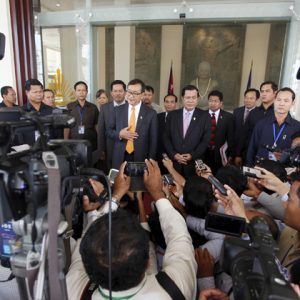Cambodia’s two political top guns have reached an unlikely accord in recent months. The “culture of dialogue” has been maligned by some, but it could play a more significant role than people think
The so-called “culture of dialogue” was established to guarantee a modus vivendi between Cambodia’s leading political parties. However, given the recent arrest of opposition senator Hong Sok Hour, despite his supposed senatorial immunity, after Prime Minister Hun Sen accused him of treason in a speech, the agreement is beginning to look a little one-sided. But Cambodian politics often follows its own logic, so it is still too early to assume the culture of dialogue has already failed.

It does seem likely, though, that Hun Sen might now regard the concessions he granted the opposition Cambodia National Rescue Party (CNRP), in return for dampening its disquiet over the 2013 national election results, as an own goal. With the reshuffling of the National Election Committee agreed, along with the CNRP being granted a licence for its own TV channel, the opposition looks to be in a good position to capitalise on its strong showing in the 2013 elections. As long as opposition leader Sam Rainsy shares this perspective, he will adhere to the culture of dialogue, irrespective of any provocation from his political rival.
In truth, the culture of dialogue seems to be little more than an agreement between the two party leaders, rather than the parties themselves. With the exception of the so-called ‘code of conduct’ – a set of rules for public speeches that is supposed to reduce tensions between the parties – it hardly includes a vertical component, such as dialogue between parties or even with the public. While the relative informality of the agreement has not stopped the persecution of opposition activists – such as those who took part in a July 2014 pro-democracy rally and were subsequently jailed on widely decried insurrection charges – the arrest of the senator could be a step too far. At the moment it almost seems that any lawmaker could be arrested at the drop of a hat, but most likely that hat would drop at political engagements that promise public support. Therefore it is not surprising that Hong Sok Hour’s arrest is apparently connected to the CNRP’s stance in its long-running border dispute with Vietnam.
By pressuring the opposition, Hun Sen seems to be discouraging dissent. He might be hoping that, as a result, the CNRP will adopt a lower public profile and thus forfeit its popularity among voters step by step. However, this plan also requires the ruling Cambodian People’s Party (CPP) to offer approaches that can shore up public support.
Although the arrests have not prompted major protests, that does not mean that ruling by fear is proving successful like it did in the past. Instead, it seems that the CNRP are waiting for their chance at polling day.
However, winning the next national election in 2018 would not automatically mean that the opposition takes over government. Hun Sen’s control of Cambodia’s security forces, the police and military, are just as significant, perhaps even more so, as controlling state institutions. Effectively, a change in government only becomes possible when Hun Sen agrees.
If he does agree to a change following the next election, it is unlikely Hun Sen would ever get the chance to formally lead the country again, given his age. However, as lifetime president of the CPP, he will remain extremely influential, most likely for the sake of his children’s political ambitions. Again, speaking hypothetically, it might be in the CPP’s interest to ensure a peaceful transition of power, as this might come alongside negotiations that allow representatives of the old regime to retain wealth and certain privileges, as well as provide a platform for the party to fight for power again.
Therefore, despite the inevitable setbacks, it remains likely that the culture of dialogue will endure. It might even prove a key precondition for a successful and peaceful transition of power – and remain integral in the aftermath.
Markus Karbaum is an independent consultant specialising in Cambodian politics
The information and views set out in this article are those of the author and do not necessarily reflect the opinion of the Southeast Asia Globe
Keep reading:
“A history of violence” – Forty years ago, the Khmer Rouge entered Phnom Penh, ushering in unprecedented death and destruction. This short but seismic era casts a long shadow over the Kingdom to this day


